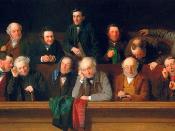There is always more than one way to go about solving any given problem. The closing statements of Atticus Finch in To Kill a Mockingbird and another attorney in A Lesson before Dying differ in many respects as to how they go about arguing for the same purpose: the acquittal of their defendants. In the end, Atticus Finch's argument is, objectively, more persuasive. Unlike the other attorney, Atticus draws on logic to support his defendant's position, placing him as an equal of the jury, and asking the jury, above all else, to do their duty.
Easily the most striking difference between the two arguments is the place that the orators attempt to position their defendants. Atticus, who plans to use logic as his weapon, treats his client with respect. He never insults his intelligence, and even implies that his client felt pity, a condescending emotion, toward the chief witness: "And so a quiet, respectable, humble Negro who had the unmitigated temerity to 'feel sorry' for a white woman has had to put his word against two white people's."
Meanwhile, the other lawyer, keenly playing on the prejudices of the jury, explains to them why his client is so beneath them as to be deserving of their pity and mercy. He constantly refers to him as a "fool." He even dehumanizes him, saying that his client is "A thing to hold the handle of a plow, a thing to load [the jury's] bales of cotton, a thing to dig [the jury's] ditches, to chop [the jury's] wood, to pull [the jury's] corn." While Atticus uses this placement as a device to engender the equality between the jury and the defendant that merits the frank, honest, and logical use of the law, the other attorney uses it as an argument, "in...



Fascinating
fascinating and a very appropriate length. maintains readers interest throughout. well written.
2 out of 2 people found this comment useful.